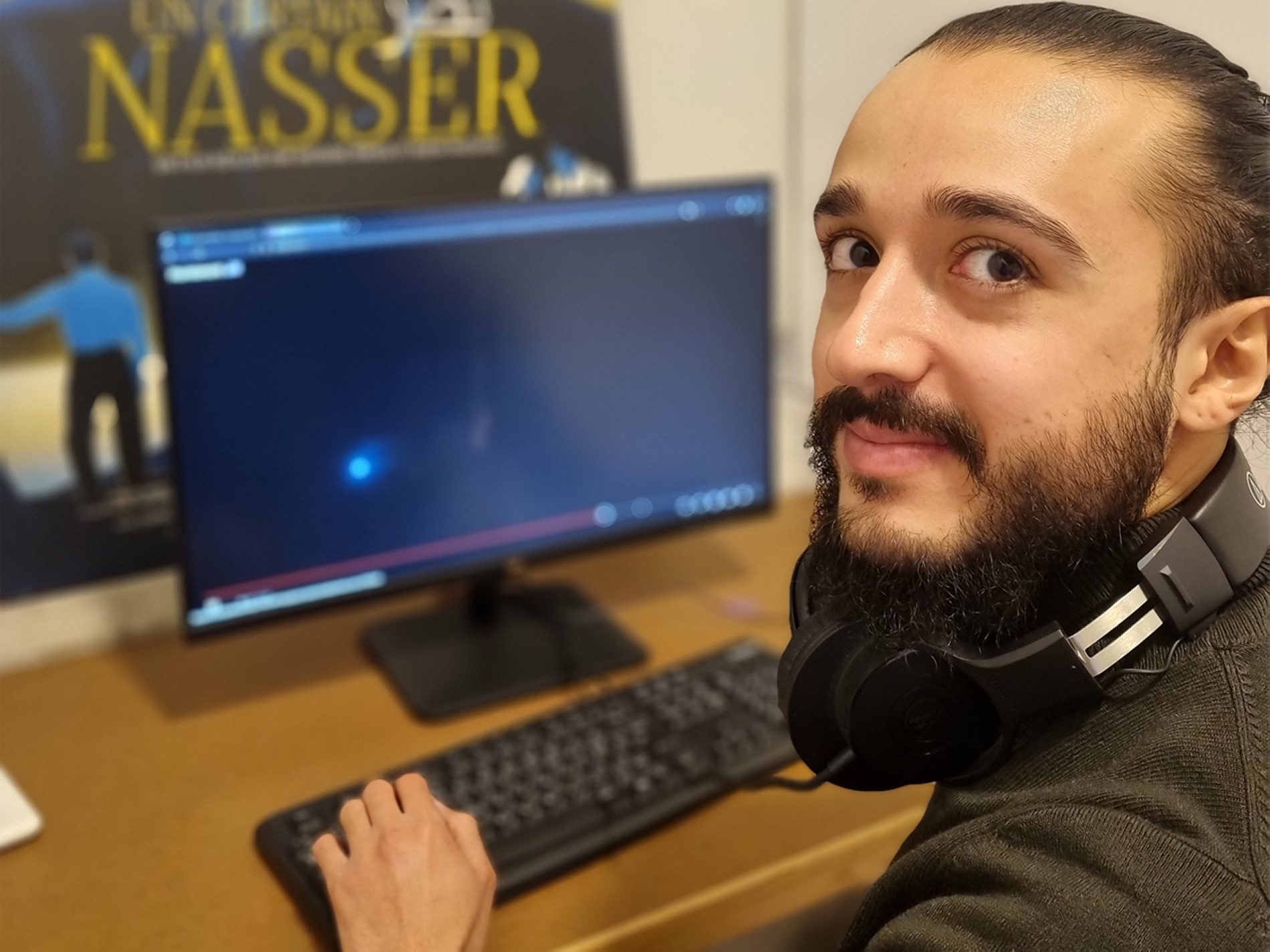A 22-year-old art degree graduate is immersed in a sea of finely rolled paper cylinders. They know the addresses, classifications, and precise locations of these precious scrolls stacked on metal shelves. This is Karim Naamani, and he is working with carefully preserved cinematic film posters.
Naamani, who graduated just over a year ago, has spent 15 months as a volunteer here at Cinematheque Beirut, Lebanon’s national film archive, learning the reels and rolls. One is spread out on the ground, instantly revealing a world of colour. He says he is gaining a parallel education in cinema and society—one that rivals anything he ever learnt in the classroom.
The archive carries not only the city’s name but also its great ambitions: to strengthen Lebanon’s cultural identity by restoring a history rooted in its film industry. Housing a database of 2,000 short and feature films spanning various genres, including 400 available for viewing, Cinematheque Beirut is now celebrating four years since its revival.
It safeguards hundreds of posters collected over two decades from places like Cairo, Tunis, Baghdad, and Damascus, along with an extensive collection of books, magazines, and brochures. “Here, I find a world where I feel belonging, loyalty, and trust,” Naamani tells Al Majalla, his long flowing hair reminiscent of a silver screen hero.
It harks back to an earlier era. In the 1960s, Beirut’s cinemas were packed with eager audiences watching the likes of Garo, a Lebanese film by Armenian director Gary Garabedian starring Mounir Maasri. Inspired by real-life events, it is the story of an outlaw who defends the marginalised and the poor.
Maasri drew upon his US training and athletic agility (he was a volleyball champion) to captivate audiences with daring leaps across Beirut’s rooftops, evading gangs and police alike, bringing exhilarating action to the screen.

A few years later, director Garabedian was killed by a bomb explosion in Beirut while finalising We Are All Freedom Fighters (1969), but his leading man is still alive to share the secrets, behind-the-scene moments, and untold stories of Lebanese cinema’s golden era, one that Cinematheque Beirut works tirelessly to preserve.
One of Cinematheque’s major initiatives is Tales of Lebanese Cinema, a series of professionally produced video retrospectives featuring prominent figures in Lebanon’s film industry. These interviews, rich in cinematic language, are freely available on social media platforms, engaging young audiences and film enthusiasts alike.
Alongside this project, Cinematheque is committed to building an extensive electronic database dedicated to Lebanese cinema and curating screenings of both classic and contemporary films from Lebanon and the wider region. These efforts play a vital role in safeguarding Lebanese cultural heritage and passing on the art of cinema to future generations.
A pulsating passion
One of the main coordinators at Cinematheque Beirut, Mehdi Awada, belongs to a generation deeply invested in preserving and revitalising Lebanese cinema.
Moving energetically between the main reception lobby and the viewing room—where visitors can book appointments to watch films produced and filmed in Lebanon—Awada is part of the ambitious heart of this space.
“We want it to be a living place,” he explains. “Books, prints, and films are not everything. Here, we organise workshops, retrospectives on the achievements of Lebanese and Arab filmmakers, roundtable discussions, and endless debates. We are visited by pioneers and young people alike—those interested in our database of professionals and technicians, cinema enthusiasts, students working on theses, as well as researchers, writers, and journalists.”

Awada speaks with a passion and considers this home, welcoming visitors' feedback. "Youssef Chahine's photo is incomplete in the database," he says. "There's a sound glitch in a film version... It's great that you linked Randa al-Shahhal's filmography and awards to a TV interview, and Hady Zaccak's biography to old newspaper articles about him—but why not do the same for everyone? I didn't know Hassan Imam shot four films in Beirut—thank you!"
A visitor asks about his dreams for cinema in Beirut. "We want to establish an experience that reflects who we are: unconventional, with a broad and dynamic spirit," he answers. "Of course, we are shaped by our resources, the scope and quality of the films we seek to archive, and the force majeure circumstances that have impacted Lebanese cinema—realities that differ from those of other countries."
Cinematic circus
In the viewing room, two visitors sit with digital devices in hand, occasionally jotting down notes as scenes from Lebanese films of different eras unfold on the screens. A certain magic flows through the space, akin to a cinematic circus, where images flicker and emotions stir.
In The Lebanese Rocket Society (2012) by Joanna Hadji Touma and Khalil Joreige, a voice echoes with both sorrow and love. "This is not a weapon. This is what dreamers once wanted: scientists and researchers in Lebanon striving to achieve a space rocket. This is a tribute to the dreamers." The words resonate with a lost ambition.
There is a striking, dramatic moment in Roy Dib's The Beach House (2016) when the protagonist confronts his girlfriend with a sharp truth. "I hated you not because you're bourgeois, but because you're naïve," he says. "I pitied you. While you lay in the arms of revolutionaries, you were actually sleeping on my story with him."
On it goes, with mesmerising performances, but unlike in cinemas, here viewers have the chance to pause and rewind, relive any scene, dialogue, or emotion, such as in An Open Rose/Warda (2019) from director Ghassan Salhab, known for his poetic cinematic language, and the suspension of mummified birds from a tree in a barren field, with a voiceover saying: "They cannot leave their past lives. Their winter lasts forever."














